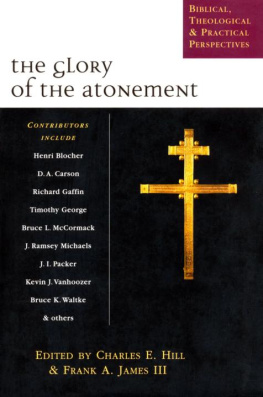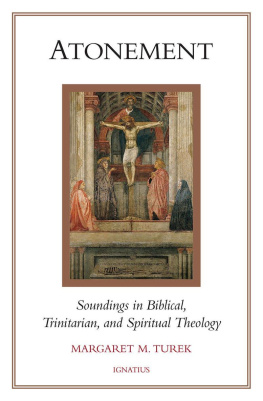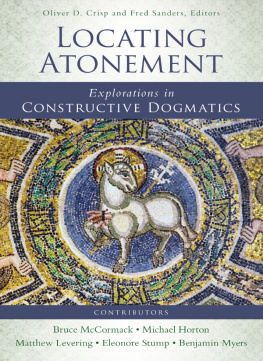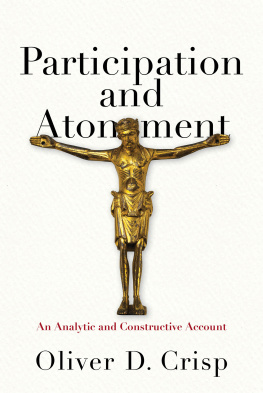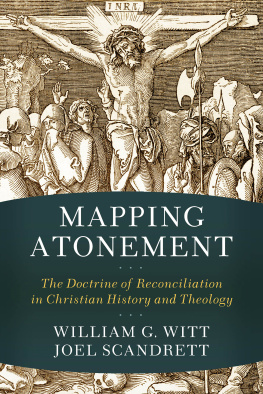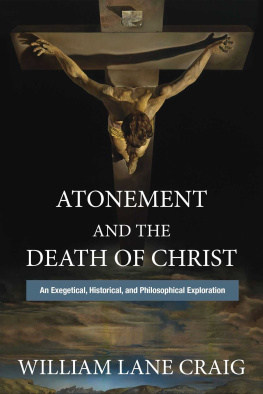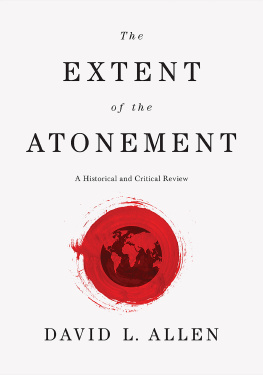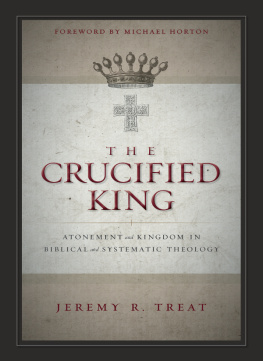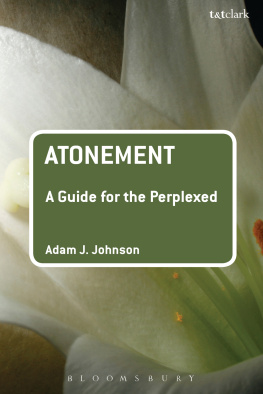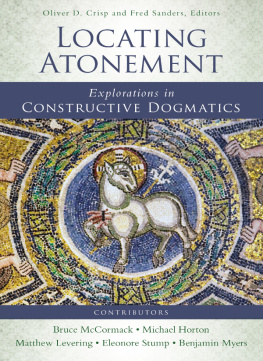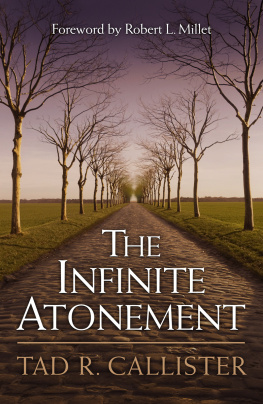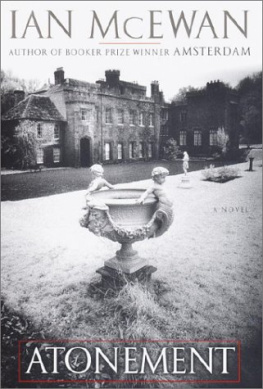CHARLES E. HILL AND FRANK A. JAMES III, EDITORS




.......................................... 7
.................. 15
................................... 23
....... 106
.................. 119
......................... 140
....................... 190
................................. 209
........................... 221
.. 239
.. 263
..... 279
........................... 304
.. 324
................. 346
.... 409
............ 426
.................. 445
................................. 453
................. 469
.................................... 473
..................................... 487
Academics are prone to lamentation-it is an occupational hazard. About three years ago the editors were lamenting the fact that there was no Festschrift for our esteemed colleague Roger Nicole. To that lament we added another. As we were bemoaning the paucity of really good thinking on the doctrine of the atonement, the idea for a book began to flicker in our minds. As we massaged the idea, we began to see a vague image of a resolution for our lament. We knew that one of his favorite doctrines, one to which he had devoted considerable academic attention over his long career, was the atonement. The fact that evangelical readers have not seen much on this topic since John Stott's The Cross of Christ in 1986 made the project even more appealing. What better way to honor our colleague and dear brother than a book devoted to the topic of the atonement? This way we could, so to speak, kill two birds with one stone.
Eventually, we took our idea to Dan Reid of InterVarsity Press, who suggested, in so many words, that we could kill a third bird. We could stimulate renewed discussion of the doctrine of the atonement among college students, seminarians and other scholars, and honor Roger at the same time. Thus, we designed this festschrift as a textbook.
One final task was to assemble a superb team of evangelical scholars and ask them to turn their academic talents to the doctrine of the atonement. Our scholars were eager to participate, both because they wanted to honor Roger for his many years of service to the church and because they wanted to address the all-too-neglected doctrine of the atonement from their particular angle of expertise. The caliber of the contributors may be seen as a tribute to Roger's reputation and relationships.
In a career spanning over half a century, Roger Nicole has been identified with a number of important doctrines such as inerrancy of Scripture, the role of women in the church and, more recently, opposition to open theism; but the doctrine of the atonement retains a special place in his theological heart. These essays are offered in fond affection for a dear friend and superb scholar.
Special thanks to two superb graduate assistants, Jeremy Alexander and Ryan Reeves, to Rev. David Bailey for sharing his recollections of Roger Nicole, and to John Muether for the subject index.




I first met Roger Nicole in the early 1970s when I was a student at Harvard Divinity School and he was a professor at Gordon-Conwell Theological Seminary on whose faculty he served for forty-one years. When Nicole first came to what was then Gordon Divinity School in 1938, the campus was in the heart of Boston. In those days, Gordon was one of the few evangelical institutions where young ministers were taught to believe that the tomb was empty without being made to think that their heads had to be. Doubtless, the school's reputation for academic rigor and spiritual vitality had attracted the brilliant young Roger, fresh from his classical and theological studies in Lausanne and at the Sorbonne, in the first place. Eventually, Nicole would earn three degrees from Gordon (B.D., S.T.M. and Th.D.) as well as an additional research doctorate (Ph.D.) from Harvard University. He joined the faculty of Gordon in 1945, and by the time I met him, he had become something of a legend there.
In 1946 Roger married the former Annette Cyr. For many decades they have modeled the graces of Christian hospitality. Several generations of students and colleagues have known the largesse of their table and the conviviality of their home. Roger has always invested himself in the spiritual formation as well as the theological development of his students, and students have responded to him with great love and affection. After his retirement from Gordon-Conwell in 1986, Roger and Annette moved to Orlando, where he continued to teach at Reformed Theological Seminary and also, on occasion, at an extension center of New Orleans Baptist Theological Seminary. David W. Bailey, one of his students from this extension center, has given the following account of Roger in the classroom:
During his lectures, several of the students, on occasion, would weep. His keen mind (as an octogenarian!) was demonstrated in his total lack of notes (just an Niv Bible and a Greek New Testament) and his ability to teach for nearly four solid hours, at night (6:00 p.m. to 10:00 p.m.), with only a twenty-minute nap in between from which he did not need to be awakened. He was gracious in handling questions from "difficult students." We were deeply impressed by his complete transparency regarding his own Christian pilgrimage, his manifest godliness, his willingness to share with the students volumes from his own library due to the limitations of an extension center library. Such obvious brilliance was coupled with a love for stamp-collecting and mystery novels and an incredible knowledge of books. One feels both more intellectual and more Christ-like just spending time with Roger Nicole.
Another former student from Gordon-Conwell remembers that Roger and Annette always had time for the little children of their students, whom they knew by name and always welcomed with open arms. Some time ago I was invited to participate in a service of ordination for one of Roger's former students. He had asked Roger to offer the prayer of consecration. I am sure that his prayer will be remembered long after what the rest of us said has been forgotten. Here was a beloved father in God, commending to the Great Shepherd of the Flock one of his own sons in the faith with such tenderness, care and solicitude, but also with the gravitas of a patriarch who has walked with God and who knows that this young minister will one day be called to stand before the divine bar of accountability. Hearing that prayer, I thought: This is what it means to be a theologian of the church.

